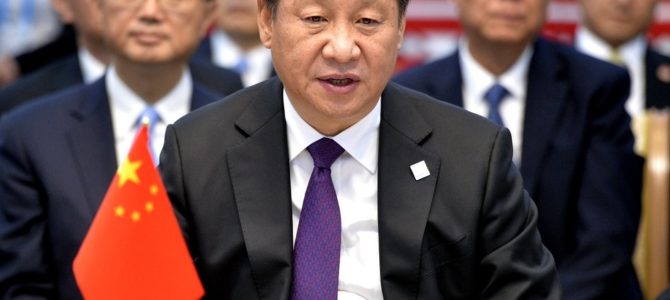
Whenever a rising power seeks to change an established order, it typically comes into a potential conflict with an established hegemon that intends to defend the geo-strategic status quo. It’s known in international relations as the “Thucydides Trap.” Harvard University professor Graham Allison has written extensively about this deadly pattern in global politics, which has arguably existed since the Peloponnesian war between Athens and Sparta.
Allison charted the past 500 years of history in his 2017 book, “Destined for War: Can America and China Escape Thucydides Trap?” He studied 16 such cases, 12 of which led to war. Of course, there were instances of no war — Spain and Portugal in the late 15th century, and Great Britain and the United States in the early 20th century.
But in those cases the two powers in question were tied not just by trade, but also by culture, and, most importantly, a common language and ethnic kinship. Allison predicts there’s a possibility that China and the United States are therefore heading for a conflict. He repeated the argument in a recent Financial Times essay.
Vice President Mike Pence recently laid out an aggressive new Trump administration policy on China, which could be heralded as a new cold war with China. In a long speech at the Hudson Institute, Pence said: “China’s aggression was on display this week, when a Chinese naval vessel came within 45 yards of the USS Decatur as it conducted freedom-of-navigation operations in the South China Sea, forcing our ship to quickly maneuver to avoid collision. Despite such reckless harassment, the United States Navy will continue to fly, sail and operate wherever international law allows and our national interests demand.”
The speech was one of the strongest by any American leader in the last decade, and included evidence that the Chinese state was manipulating and subverting the American system.
“America had hoped that economic liberalization would bring China into greater partnership with us and with the world,” he said. “Instead, China has chosen economic aggression, which has, in turn, emboldened its growing military.”
That was not all. Republican Sen. Marco Rubio has taken up the cause of human rights in China, reflecting an increasingly bipartisan consensus among American policymakers that China isn’t liberalizing anytime soon, but is actually turning the clock back. The Wall Street Journal this week reported the American strategic community has lost its patience with repeated Chinese spying, harassment, and hacking.
“At the Pentagon, military brass have historically sought a relationship with their Chinese counterparts that would survive political mood swings,” the WSJ reported. “Even there, senior officials say they have reached their limit.”
The report added that Gen. John Kelly and Gen. Joseph Dunford came back from trips to China disillusioned and hardened about the reality the United States faces. In one instance, Kelly was in an actual physical struggle, when one overenthusiastic Chinese security attaché tried to grab the American president’s nuclear football.
Is China a Threat?
So, how big a threat is China? And if this is a cold war, how is it similar, or different, from the last one? Who are the prime geopolitical actors this time, and what is the American endgame? What are we getting into?
As Reihan Salam wrote in The Atlantic, “To cosmopolitan liberals, it is Russia that serves as America’s chief geopolitical adversary. … Nationalist conservatives see rising Chinese power as the far graver threat to American interests.”
For foreign policy liberals, human rights matter more than hard power. Russia, as a conservative society with a masculine culture and virulently anti-LGBT and anti-feminist politics, is the natural antithesis to a values- and rights-oriented liberal world order. Conservatives, and especially foreign policy realists, on the other hand, are more hard-nosed about power politics. To them, China — with its second-largest economy, second-largest defense budget, the largest growing military bases, an ever-assertive blue water Navy, and salami-slicing tactics in Asia — remains the far bigger threat.
That is also close to the assessment of the American strategic community. Russia, for all its “sphere of influence” politics and delusions of grandeur, is a declining power, with a mono-industrial and static economy, demographics in perpetual decline, and stagnated innovation. It has power and a will to commit mischief, even to get into short proxy wars in the neighborhood, but there are no threats of Russian tanks running through Belgian or Polish meadows.
Also, Russia never faced any real concerted backlash. Russia wouldn’t be able to cope if Europe stops importing Russian gas, hardens resolve, bogs down Russia in Ukraine and Syria, and counter-attacks in the cyber domain. Europe won’t do it, but that’s a different matter.
A Different Beast to Tame
Consider the evidence. The American rebalancing towards Asia started with the much-vaunted pivot under President Obama, but even he got buried in the toxic, cancerous, and medieval Middle Eastern wars, despite his instinctive aversion towards foreign intervention. With Trump, there was a careful two-pronged approach towards Asia. There was an effort to cool off the permanent Korean threat and encourage a détente between the North and the South, and an effort to grow a personal relationship with China’s President Xi, while hardening the U.S. position with regard to naval patrols and trade.
China, meanwhile, has been continuously interfering in the American political system, from data hacking and cyber warfare, to spying on senile Democratic senators, to infiltrating academia. The trade negotiations between the two powers stopped after Trump decided to impose further tariffs amounting to $200 billion. However, trade was just a start.
Followed by the Sino-Russian joint military exercise, the United States sanctioned the Chinese military agency for buying Russian weapons (including jets and anti-air missile systems), which China protested as an interference in sovereign matters. In response, China also recalled an admiral and cancelled a planned military talk. Beijing demonstrated its wrath by nearly ramming a Chinese warship into a U.S. Navy destroyer and cancelling future exercises with the Chinese military.
The U.S. reaction to China was inevitable. A security dilemma and spiral, after all, is the only pattern of geopolitics. But the question remains: what new Cold War are we getting into? This is not an ideological battle like the one our fathers knew. China isn’t fomenting revolution across the globe. In fact, China wants more economic stability around the world, simply because they want to sell their goods and capture markets.
China is interested in a soft imperium — buying out lands and properties in Africa and Asia and slowly nudging Washington out as the net security provider of the region. This is a classic geo-strategic rivalry, sort of like the British Empire and Imperial Germany, although with a minimal risk of an actual war because of nuclear deterrence. China also lacks an alliance network in Asia.
But that doesn’t mean there won’t be any conflict or proxy wars. American policymakers need to keep other factors in mind. It is a multipolar world, unlike the bipolar stability of Soviet American rivalry. Russia and China are not natural allies, but regardless of how powerful America is, it cannot afford to have a simultaneous geopolitical rivalry with both the great powers. It cannot also afford to be bogged down spreading democracy in the Middle East, which is not going to stabilize in the foreseeable future.
The power of U.S. sanctions is also weakening, as countries are tired of the overuse of this economic weapon, and because its global relative power has changed since the 1990s. The EU, for example, is planning an alternative reserve currency, which will heavily weaken U.S. economic power if given a go-ahead.
While a divided Europe will lean toward the United States, due to the American security umbrella, a unified Europe might just side with China if its trade is threatened. Are American policymakers ready, united, capable, and willing to coerce Europe? How unified are the American public behind this new cold war? What about large tech companies, which are more than happy to bend over backwards to appease China but refuse to side with the Pentagon?
In American society, the forces of civic nationalism are making a comeback. That is good, regardless of what liberal internationalists think, because the world itself is changing. It is better to be a conservative realist and nationalist than to be a utopian internationalist and be slapped in the face by reality.
The new National Security Strategy is a good start. It highlights the return of a great power rivalry, but it is for the wonks. Convincing common people of the incoming long era of strategic rivalry and the necessity of it remains a Churchillian task.









